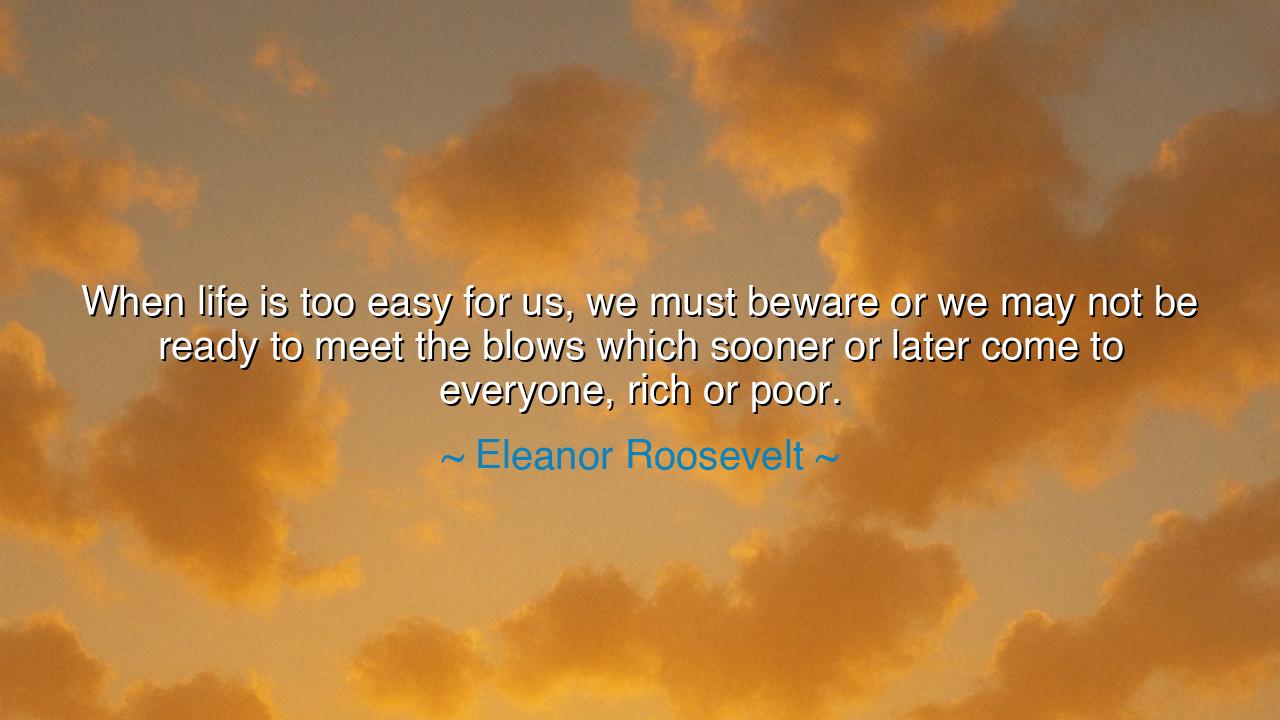
When life is too easy for us, we must beware or we may not be
When life is too easy for us, we must beware or we may not be ready to meet the blows which sooner or later come to everyone, rich or poor.






"When life is too easy for us, we must beware or we may not be ready to meet the blows which sooner or later come to everyone, rich or poor." These words by Eleanor Roosevelt speak to the deep wisdom that life’s greatest challenges often arise when we least expect them. Roosevelt warns us that an easy life, one devoid of struggle or hardship, can lead to a false sense of security. When everything flows smoothly, when we are surrounded by comfort and privilege, we may grow complacent, unprepared for the inevitable storms that will one day disrupt our peace. Whether we are rich or poor, we are all susceptible to life’s blows, and those who have not experienced the refining fire of difficulty may falter when adversity strikes.
This idea echoes the teachings of the Stoics, who believed that adversity and suffering are natural parts of life that help forge a strong character. Epictetus, one of the most influential Stoic philosophers, argued that it is not the absence of hardship, but the way we respond to it, that determines the quality of our life. He emphasized that virtue comes not from avoiding pain or struggle, but from facing it with courage, wisdom, and self-control. The Stoics believed that those who live lives of comfort and luxury without ever facing hardship risk losing the resilience and strength necessary to endure life’s inevitable trials.
The ancient Greek hero Hercules provides an apt example of how challenges shape character. Hercules’ life was defined by the Twelve Labors, a series of near-impossible tasks that tested not only his physical strength but also his moral and mental resilience. His struggles were essential in forging his heroic character, and it was through these trials that he gained the respect of both gods and men. Had Hercules lived an easy life without these challenges, he would not have become the symbol of strength, perseverance, and wisdom that he is today. In the same way, Eleanor Roosevelt’s warning reminds us that without adversity, we risk living a life that is untested, fragile, and unprepared for the inevitable hardships that will eventually come our way.
Consider also the life of Abraham Lincoln, who, despite being born into poverty, faced countless hardships throughout his life, including the loss of family members, the financial struggles of his early years, and the brutal emotional toll of leading the nation during the Civil War. Lincoln’s strength was forged through these trials, and it was in his suffering that he found the resolve to navigate the country through its darkest hours. His ability to persevere in the face of such immense challenges and maintain his sense of compassion and integrity is a testament to the truth of Roosevelt’s words: adversity shapes and strengthens us, and those who face it with courage emerge stronger, wiser, and more capable of handling future difficulties.
In contrast, the lives of those who are born into wealth and comfort, such as royalty or the aristocracy, often present a different challenge. While they may have every material advantage, they are often shielded from the struggles that cultivate resilience and humility. For example, the French monarchy in the late 18th century, with its lavish lifestyle, was unprepared for the storm of revolution that would tear it down. The royals, accustomed to privilege and comfort, lacked the fortitude and wisdom that comes from facing hardship. The French Revolution shattered the illusion of security for those who lived too easily, and the consequences of this unpreparedness were tragic for the monarchy. Like Eleanor Roosevelt said, without the experience of struggle, we are left vulnerable to life’s unpredictable forces.
The lesson from Roosevelt’s quote is one of preparation and humility. Life is unpredictable, and even in the midst of ease and comfort, we must recognize that challenges are a natural part of existence. The key to navigating life’s blows is not to avoid them but to prepare ourselves—through the cultivation of strength, resilience, and wisdom. When life is easy, it is easy to become complacent, to believe that we are immune to hardship. But in truth, it is in the hardships that we find our strength, and it is through facing adversity that we grow into our true selves.
In practical terms, we can take this lesson by embracing life’s challenges rather than avoiding them. When faced with difficulty, instead of retreating, we should ask ourselves, "What can I learn from this?" We must develop the mindset that sees struggle as an opportunity for growth, not as a punishment. Whether in our personal lives, in our careers, or in our relationships, we can prepare ourselves for life’s blows by cultivating resilience, patience, and self-awareness. Just as Socrates taught that wisdom is gained through questioning and experiencing, we too must embrace the hardships that come our way, knowing that they are the very forces that will shape us into stronger, wiser individuals.
By embracing adversity, we not only prepare ourselves for the inevitable challenges of life, but we also become better equipped to support others. Just as Lincoln led his country through difficult times, we can lead with compassion and strength when faced with trials. It is in adversity that we are truly tested, and it is through perseverance in the face of difficulty that we come to understand our greatest strengths.






AAdministratorAdministrator
Welcome, honored guests. Please leave a comment, we will respond soon